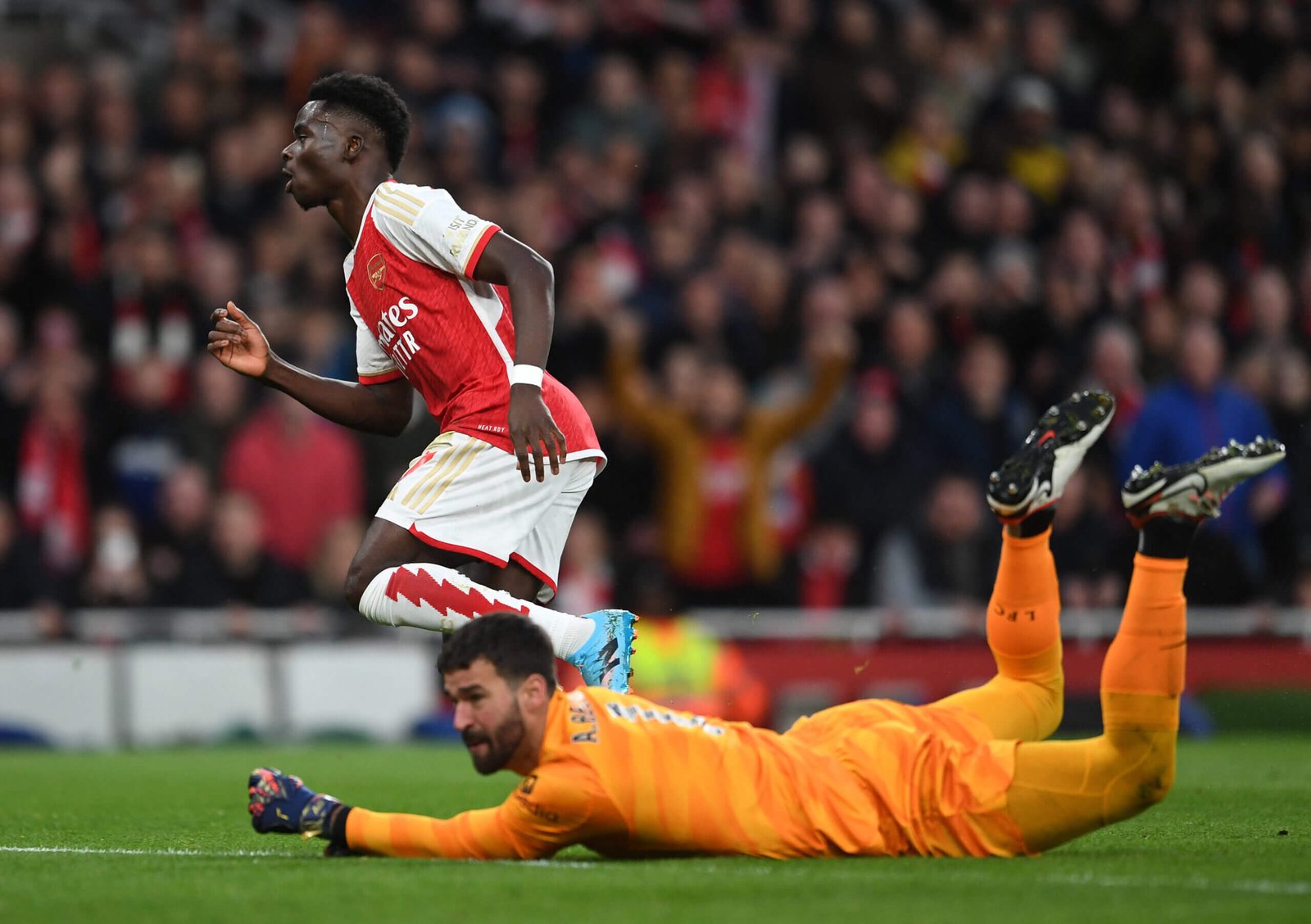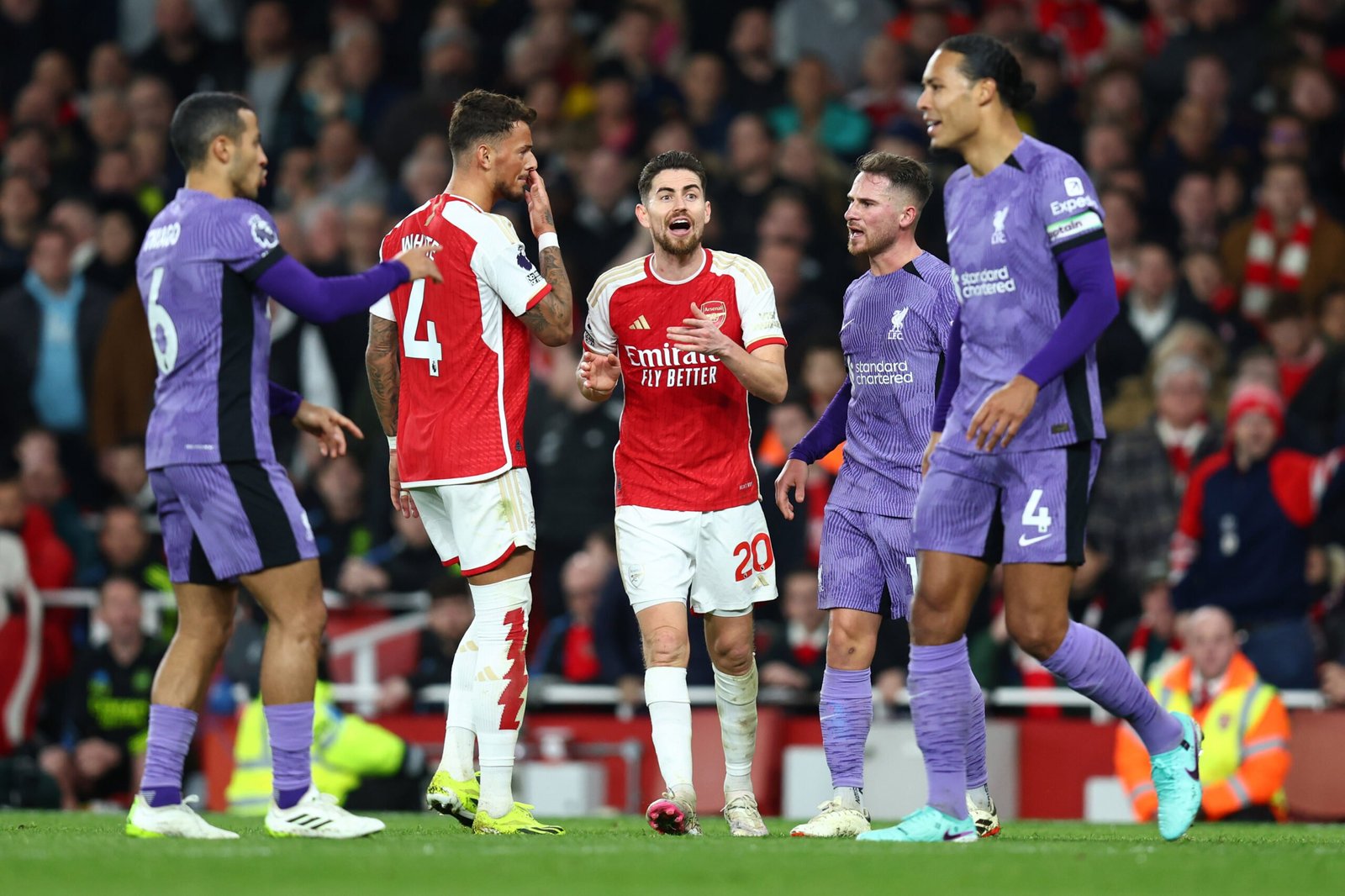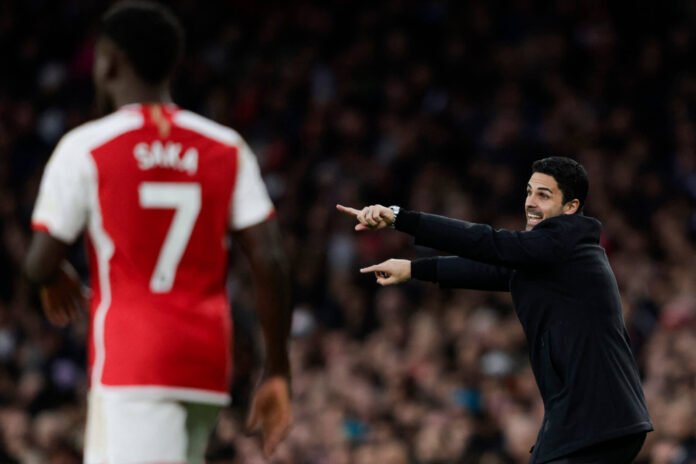This is how it feels to crank up the emotion. This is how it feels to bring back the pandemonium. This is how it feels to have full-throttle sprints and thumping tackles, maximum effort and mind-boggling mistakes.
Chaos football returned to Arsenal. It was more like the emotional energy that fuelled them last season and it felt right.
This season, Mikel Arteta has tried to rein that in a bit, to exert more control and patience into their game plan in an attempt to cut out the costly moments of madness. But a certain amount of emotional energy, for better or for worse, suits this Arsenal team.
Arteta praised the way his players “put their heart and soul in every single ball”. The whole place was ignited by it.
The Emirates crowd bayed in appreciation of Declan Rice’s tackling exhibition, fists shaking each time he expertly threw a foot in front of the ball. They screeched as Gabriel Martinelli galloped as if nothing else in the world mattered other than chasing down the left channel.
They chorused for the unsung hero, Jorginho, turning a rare start into a masterclass. They applauded as Kai Havertz unsettled Liverpool’s defence as a ‘No 9’ who excelled in the dirty work of a centre-forward.
In the way the players dominated and showcased their capabilities in the vast majority of the first half (barring 10 seconds of self-inflicted carnage), and in the manner of the necessary regroup, to re-find their footing and go for it in the second half, Arsenal made an important step. They gave what Mikel Arteta calls “our people” an Arsenal to believe in again.
Rice lunges in to dispossess Alexis Mac Allister (Charlotte Wilson/Offside/Offside via Getty Images)
It has taken a while to do that during this strangely unlovable campaign, but the positive feeling at the end was tangible.
Jorginho, with all his influence and experience, described the psychology of the team as getting “more mature”, and it is telling they were able to deal with the different mental challenges as the game state lurched.
So is it about Arsenal finding the right balance between chaos and control to be at their most effective?
“Control is not really a word I like,” Arteta countered. “I like ‘dominance’ and not allowing teams to breathe more than ‘control’. In which part of the pitch that happens is the most important thing but, yes, we can be very chaotic in open spaces and can create a lot of issues playing in different ways.”
Arsenal’s experience across the game could be broken down into five parts.
The first was thrilling. They began full of dynamism, eager to press and set a high tempo. An expressive first half that should have yielded more than the one goal they mustered. Havertz was released into a wonderful position by Martin Odegaard’s dazzling pass. He took his time to pick his finish, only to prod the ball gently straight at Alisson.
Luckily, the goalkeeper’s weak parry fell for Saka to drill into the net. The dominance and chance creation continued until first-half stoppage time.

Saka opens the scoring to reward the hosts’ early frenzy (David Price/Arsenal FC via Getty Images)
Part two was absurd.
A lunacy of a goal to give away. In first-half stoppage time, William Saliba and David Raya got tangled up in a harrowing defensive miscommunication. It left everyone wondering how crushing it might be to spend 45 minutes climbing up a ladder only to spend 10 seconds sliding down a snake.
Part three was about serious reflection in the dressing room at half-time. Jorginho described the scene. “We went into the dressing room and we spoke, we said what we needed to say and we didn’t drop the energy of the team.”
As well as the quality of performance, he takes responsibility to talk a lot. “Yes, I kind of do!” he enthused. “But it is all in a positive way — just trying to help because the team was brilliant in the first half, so we couldn’t let the goal affect us.”
Arteta added some more context: “We said, ‘Listen if you want to beat them you have to suffer’.

The experienced Jorginho (No 20) was influential on and off the pitch (Charlotte Wilson/Offside/Offside via Getty Images)
Part four was suffering in action.
Liverpool came out to intimidate after the break. It put deflated Arsenal on the back foot, and they had to dig deep to reset and restore their composure.
Part five was about re-energising to drive at their opponent in search of victory.
Martinelli, whose sprints into Liverpool territory had caused problems all afternoon, was in the right place to unsettle Virgil van Dijk and Alisson. When they showed their variation on the Saliba-Raya mishap, Martinelli was perfectly positioned to plunder, stabbing the ball into an empty net.
What luck took away, luck unbelievably gave back and the crowd were incredulous when substitute Leandro Trossard showed the trickery and acceleration to force Liverpool’s defence to crack again.

Trossard completes the scoring in stoppage time at the end (Stuart MacFarlane/Arsenal FC via Getty Images)
What sorcery was afoot? So many uncharacteristic errors shaped the game. But as Arsenal celebrated a result, and a new momentum, they cared not about the details.
Rice, Havertz and Odegaard fell to the turf at the final whistle. Jorginho was doubled over. A little later, once they had showered and changed, they were all smiles, all belief, all looking forward to what comes next. That high-emotion effort was worth it.
As Arteta summed up, “Three really convincing wins in a row, the team playing really well and we have to go for it. The thing is, to be the best and have the best mentality you have to do it every three days.
“The whole season is now ahead of us.”
(Top photo: Ian Kington/AFP via Getty Images)
Read the full article here


